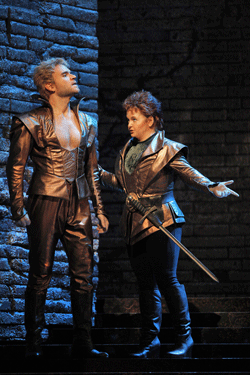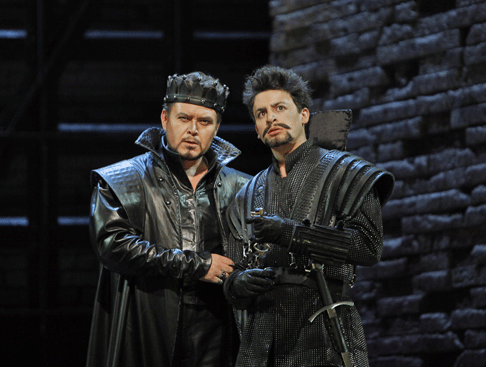Venetian facades are marble, not brick, thus it takes more than blue light rippling on red brick walls to evoke Venice. Lucrezia’s new home Ferrara was not towering walls of Styrofoam bricks painted red, plus it is obvious that all of Lucrezia’s evil machinations did not occur in a strong, golden sunset sidelight.
Rolex is not spelled Borgia, even though the golden insignia that hung over the stage seemed to advertise luxury watches, and the B wrenched from the Borgia name (that somehow found itself inscribed on a tomb in Ferrara) was a dead ringer for the serifed first letter of Bulgari.
Amazingly Mme. Fleming’s second act, stupendously rich gown upstaged both red Styrofoam and gold gel (the transparent film that colors stage lights), and the ridiculousness of her third act soldier disguise (revealing ample décolletage under a bouffant wig) upstaged her maternal anguish (she had had to poison her son).
 Michael Fabiano as Gennaro and Elizabeth DeShong as Maffio Orsini
Michael Fabiano as Gennaro and Elizabeth DeShong as Maffio Orsini
Mme. Fleming has carefully nurtured the image of American artistic luxury. Her porcelain persona was everywhere evident on the War Memorial stage. Mme. Fleming is at the same time a very intelligent artist who possesses a unique talent and a beautiful voice. Perhaps if this production had presented her as a real person we might have perceived a full, beautifully voiced character of brutal mind and twisted integrity.
Donizetti and his librettist’s idea of Lucrezia Borgia is as a bel canto heroine — no matter how horrible a person she may be, and how terrible her circumstances become, the music must always be beautiful, her voice soaring gloriously. Bel canto titillates its acolytes (willing audiences) with this contradiction. In the artificial atmospheres of this production that set out solely to beautify Mme. Fleming she read as dramatically and vocally insipid. And, well, the opera is all about her.
Lucrezia Borgia boasts sensational subject matter beyond infanticide. Her son Gennaro has sworn eternal love to his friend Maffio Orsini, who is actually a girl because it is a pants role. So a guy loves a guy who is actually a girl. Unfortunately this production precluded any resulting sexual titillation by casting diminutive mezzo Elizabeth DeShong as Orsini who read as Gennaro’s belligerent baby sister.
Even so the B in bel canto did succeed somewhat in forcing its way into the theater. Italian conductor Riccardo Frizza provided a solidly idiomatic if uninspired reading of Donizetti’s score, perhaps in reaction to the production. American tenor Michael Fabiano gave great pleasure, as a singer he is stylish and correct as evidenced in his splendid “Di pescator ignobile," and he glowed as an accomplished actor in scenes with his no affect mother. Ukrainian bass Vitalij Kowaljow made a big impression as Lucrezia’s third husband, Alfonso d’Este, tearing up the stage with his showpiece "Vieni, la mia vendetta!"
 Vitalij Kowaljow as Duke Alfonso and Daniel Montenegro as Rustighello
Vitalij Kowaljow as Duke Alfonso and Daniel Montenegro as Rustighello
While Mlle. DeShong did not physically measure up to Orsini she proved herself to be a strong singer. Among the smaller roles the Rustighello of Adler Fellow Daniel Montenegro was effectively drawn.
The libretto by Felice Romano is undeserving of ridicule. It accomplishes what a bel canto libretto sets out to do — create situations that can only be resolved by beautiful singing. But Lucrezia Borgia is like a carefully constructed short story where there is not one word too many, and in fact Donizetti revised the opera several times so maybe there is not one note too many either. It is this stark minimalism that shunts this blunt opera from masterpiece status.
Stage direction, sets and costumes are all by English producer John Pascoe, a production he created for Mme. Fleming at the Washington Opera in 2008.
Michael Milenski


